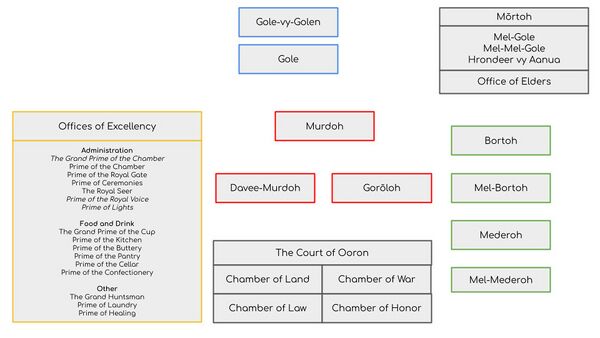Hogloh vy Aanua
Hogloh vy Aanua /hɑg'lə vi aɪ'nɔɪ/ (Order of the House) is a system of ranks that originated in the State of Asdoh in the middle of the 16th CFR. It has generally persisted over the ages and is continued to be used today, although a number of significant power balancing changes have been introduced in Toor and later in Mantareia. Assemblic monarchy has shifted away from many of the household-oriented titles, instead expanding the administrative ranks and effectively elevating the Uron court to the Assembly.
Hogloh vy Aanua is believed to have either originated or been heavily inspired by a similar system in Dantria. Settlers of the Dawn have exported a similar system to Yammoe, although that system has experienced a more turbulent evolution.
During the Mōroh period, toors frequently used simplified systems of ranks, but ones that were invariably based on the Hogloh of Aanua.
Recursive nature of the system.
Ranks
Gole
Gole /gɑ'lɛ/ (pl. Golen) is a monarch. In the absence of gole-vy-gole (king of kings), gole is the highest royal title of the land.
The title is used for both males and females. The gole's spouse does not hold the title, but is the first in the line of succession to the throne. In some cases, when the spouse takes the throne, due to gole's untimely death, for example, the regent might be referred to as Mel-Gole - "lesser monarch". This is not to lessen the standing of the regent, but to stress the status of the one passed away.
Gole Jeenor (King General) is a title frequently used by warlords. It is also sometimes used if the ruler has no descendants or if the ruler does not wish for their descendants to inherit the title, or if the system of government does not permit the title to be hereditary for one reason or another. In most cases gole jeenor is the same as gole and carries a cultural note, but in some cases gole jeenor would be considered of a slightly lesser status than a proper gole.
Gole-vy-gole (king of kings) is an imperial rank used by rulers who preside over several territories and peoples. Some monarchs have used the title to signal an ambition to build an empire and to proclaim their status to be higher than that of other monarchs. In some cases, the usage of the title would provoke a conflict.
Murdoh
Main article: Murdoh
Murdoh is the title of governor, designated to a non-elected public official with the power to run a non-sovereign level of government, typically a city or a region of a state. Appointed by the head of state, it is usually the second-powerful rank in the country. Murdon have their own court that has the same structure as that of a Gole, including having their own Goler Poton (the Royal Guard).
Oora
Oora /'ʊrɑː/ (pl. Ooron, Uron), spelled as Uroh before the second revolution and usually translated to "Lord", is a member of a ruler's court and/or trusted circle in a broader sense. Most courtiers of a monarch are Ooran.
An Oora can be appointed to virtually any position. For instance, although a Jeenor is a position usually attained through an army career, any Oora can temporarily or permanently replace Jeenor on the order of a King or a Murdoh. Ooron get appointed to the Assembly in assemblic monarchies. They are the ones chosen as negotiators in a toor.
Oora of land
Oora of land is the oldest Oora rank that dates back to the first revolution and the State of Asdoh, with possible links to Western Dantria. It effectively gives its holder total control of a piece of land, coupled with complete obedience to the Gole. The latter means that a perceived betrayal gives the Gole the power to revoke the title and any control of a piece of land that comes with it.
Interestingly enough, however, the Gole cannot cancel the title itself. This has to do with the Gole Assent, which is the three promises that formalize the justification of Gole's power to his nobles:
- The Promise of Justice
- The Promise of Stability
- The Promise of the True Path
Gole Assent's literal phrasing is that these promises "explain gole's power".
